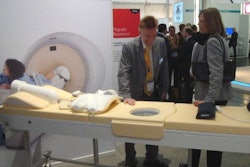
NEW YORK (Reuters Health), Mar 11 - While vaginal dilation might help treat late effects of pelvic irradiation, evidence does not support routine dilation during or immediately after radiotherapy.
This finding from a meta-analysis is in contrast to current U.K. guidelines, which recommend routine vaginal dilation during and after pelvic radiotherapy to prevent stenosis.
In their report, lead author Dr. Nicholas Johnson of Royal United Hospital, Bath, U.K., and colleagues note that vaginal dilation has been associated with traumatic rectovaginal fistulae and "psychological consequences." If dilation during or after radiotherapy is to be recommended, "we must acknowledge its rare potential for serious harm and accept the cost of supporting women during therapy, and we must be sure we understand the rationale for treatment," they write.
The researchers performed a Cochrane-style systematic review and meta-analysis to assess data relevant to vaginal dilation and stenosis associated with pelvic radiotherapy for endometrial and cervical cancer. Their results were published February 16 online in BJOG.
Out of 256 studies that commented on vaginal dilation, "very few contained data from any ... scientific study," the authors say.
A number of trials gave recommendations on dilation therapy, but only seven focused on stenosis associated with radiotherapy. Vaginal fistulas or psychological morbidity are described in case reports. Two studies reported that encouraging dilation increased compliance; however, there was no difference in sexual function scores.
One study revealed no advantage from inserting mitomycin C. One report that included five cases implied that stenosis can be treated by dilation many years after radiotherapy. Another report implied that stenosis rates were lowered with dilation, but the control group was not comparable.
In one uncontrolled study with 89 women, the median vaginal length six to 10 weeks after therapy was 6 cm. Four months later, the median length was 9 cm. No further significant increase was achieved with continued dilation four and eight months later.
"The psychological implications of imposing (dilation) therapy are very variable, and can't be assessed by a formal quantitative study," the authors write, nor can the "physical trauma associated with (dilation) during the healing peri-inflammatory phase."
They conclude that current U.K. guidelines should be revisited because vaginal dilation during radiotherapy is: "(i) costly in terms of healthcare time; (ii) plausibly associated with greater scar formation, rather than less; (iii) associated with case reports of very serious damage following its treatment; (iv) causes psychological sequelae for some women; and (v) there is no good supporting evidence for it."
BJOG 2010.
Last Updated: 2010-03-10 17:11:01 -0400 (Reuters Health)
Related Reading
Quality of life better with brachytherapy for endometrial cancer, August 17, 2009
Copyright © 2010 Reuters Limited. All rights reserved. Republication or redistribution of Reuters content, including by framing or similar means, is expressly prohibited without the prior written consent of Reuters. Reuters shall not be liable for any errors or delays in the content, or for any actions taken in reliance thereon. Reuters and the Reuters sphere logo are registered trademarks and trademarks of the Reuters group of companies around the world.


















